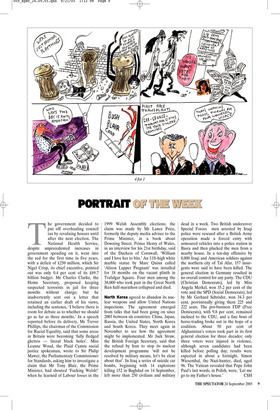PORTRAIT OF THE WEEK T he government decided to put off
overhauling council tax by revaluing houses until after the next election. The National Health Service, despite unprecedented increases in government spending on it, went into the red for the first time in five years, with a deficit of £250 million, which Sir Nigel Crisp, its chief executive, pointed out was only 0.4 per cent of its £69.7 billion budget. Mr Charles Clarke, the Home Secretary, proposed keeping suspected terrorists in jail for three months without charge; but he inadvertently sent out a letter that retained an earlier draft of his views, including the sentence, ‘I believe there is room for debate as to whether we should go as far as three months.’ In a speech reported before its delivery, Mr Trevor Phillips, the chairman of the Commission for Racial Equality, said that some areas in Britain were becoming ‘fully fledged ghettos — literal black holes’. Miss Leanne Wood, the Plaid Cymru social justice spokesman, wrote to Sir Philip Mawer, the Parliamentary Commissioner for Standards, asking him to investigate a claim that Mr Tony Blair, the Prime Minister, had shouted ‘Fucking Welsh!’ when he learned of Labour losses in the 1999 Welsh Assembly elections; the claim was made by Mr Lance Price, formerly the deputy media adviser to the Prime Minister, in a book about Downing Street. Prince Henry of Wales, in an interview for his 21st birthday, said of the Duchess of Cornwall, ‘William and I love her to bits.’ An 11ft-high white marble statue by Marc Quinn called ‘Alison Lapper Pregnant’ was installed for 18 months on the vacant plinth in Trafalgar Square. Four men among the 38,000 who took part in the Great North Run half-marathon collapsed and died.
North Korea agreed to abandon its nuclear weapons and allow United Nations inspections. The agreement emerged from talks that had been going on since 2003 between six countries: China, Japan, Russia, the United States, North Korea and South Korea. They meet again in November to see how the agreement might be implemented. Mr Jack Straw, the British Foreign Secretary, said that the refusal by Iran to stop its nuclear development programme ‘will not be resolved by military means, let’s be clear about that’. In Iraq a series of suicide car bombs, beginning with 14 explosions killing 152 in Baghdad on 14 September, left more than 250 civilians and military dead in a week. Two British undercover Special Forces men arrested by Iraqi police were rescued after a British Army operation made a forced entry with armoured vehicles into a police station in Basra and then plucked the men from a nearby house. In a ten-day offensive by 8,000 Iraqi and American soldiers against the northern city of Tal Afar, 157 insurgents were said to have been killed. The general election in Germany resulted in no overall control for any party. The CDU (Christian Democrats), led by Miss Angela Merkel, won 35.2 per cent of the vote and the SPD (Social Democrats), led by Mr Gerhard Schröder, won 34.3 per cent, provisionally giving them 225 and 222 seats. The pro-business FDP (Free Democrats), with 9.8 per cent, remained inclined to the CDU, and a fine bout of horse-trading broke out in the hope of a coalition. About 50 per cent of Afghanistan’s voters took part in its first general election for three decades; only three voters were injured in violence, although seven candidates had been killed before polling day; results were expected in about a fortnight. Simon Wiesenthal, the Nazi-hunter, died, aged 96. The Vatican revealed that Pope John Paul’s last words, in Polish, were, ‘Let me go to my Father’s house.’ CSH
































































 Previous page
Previous page